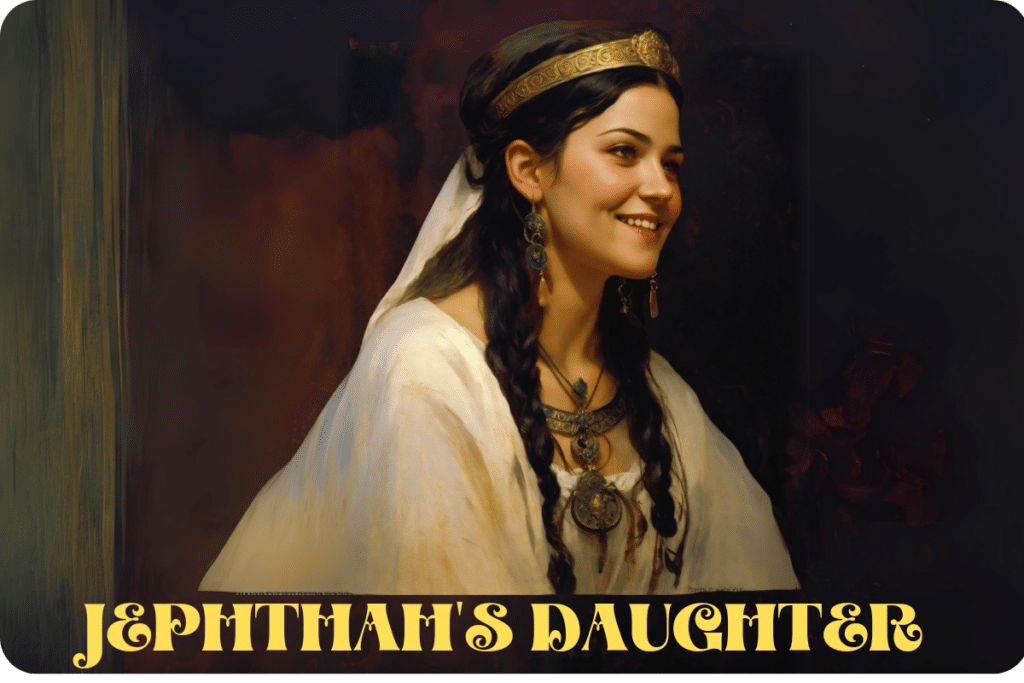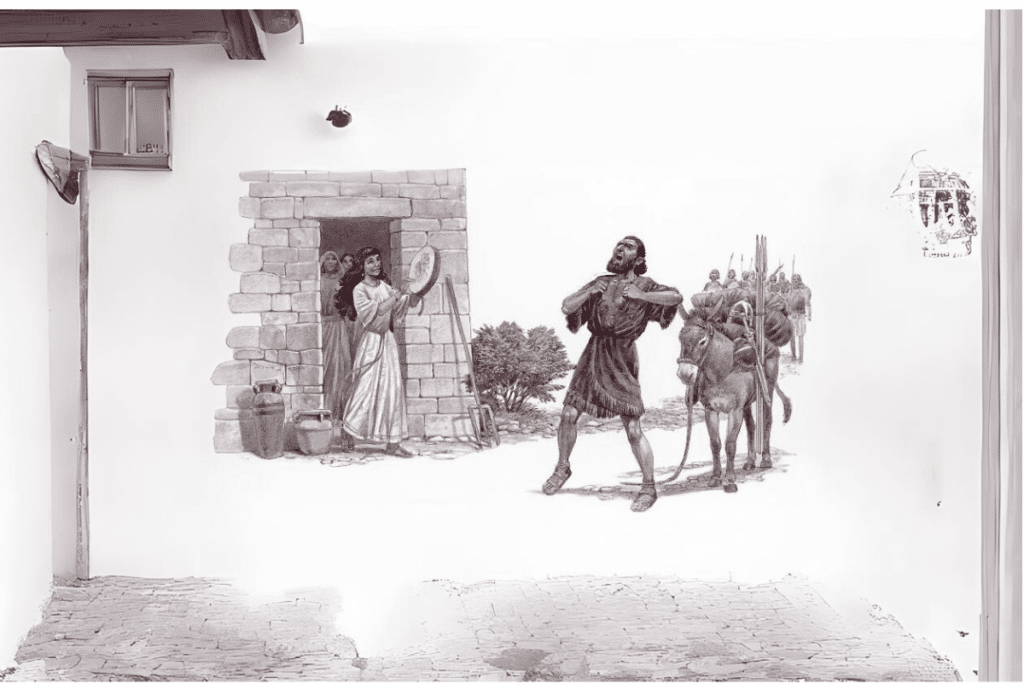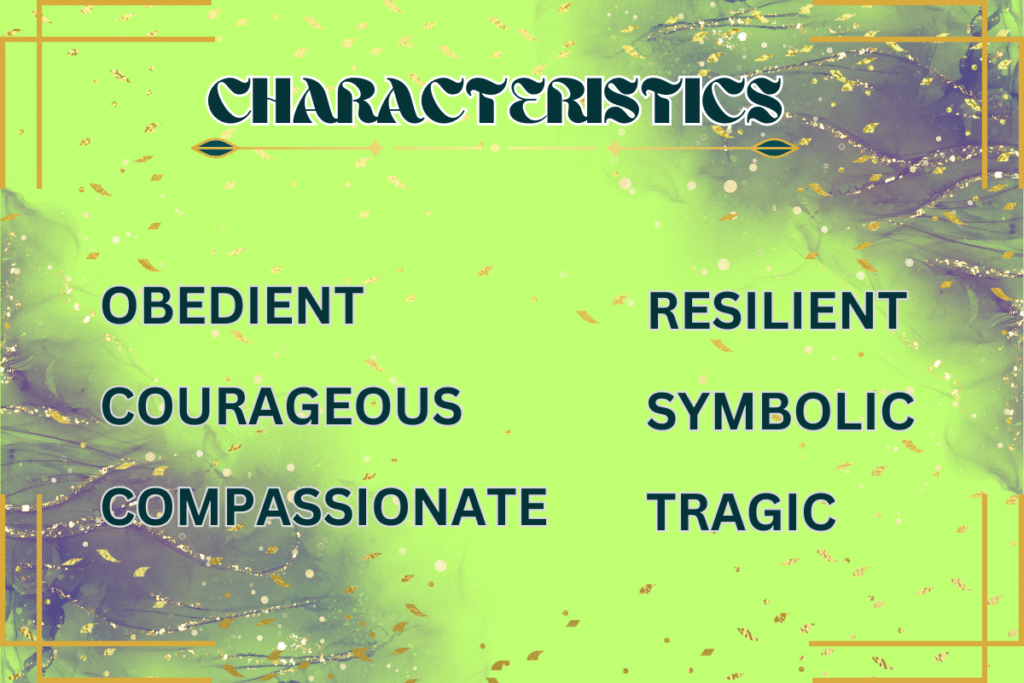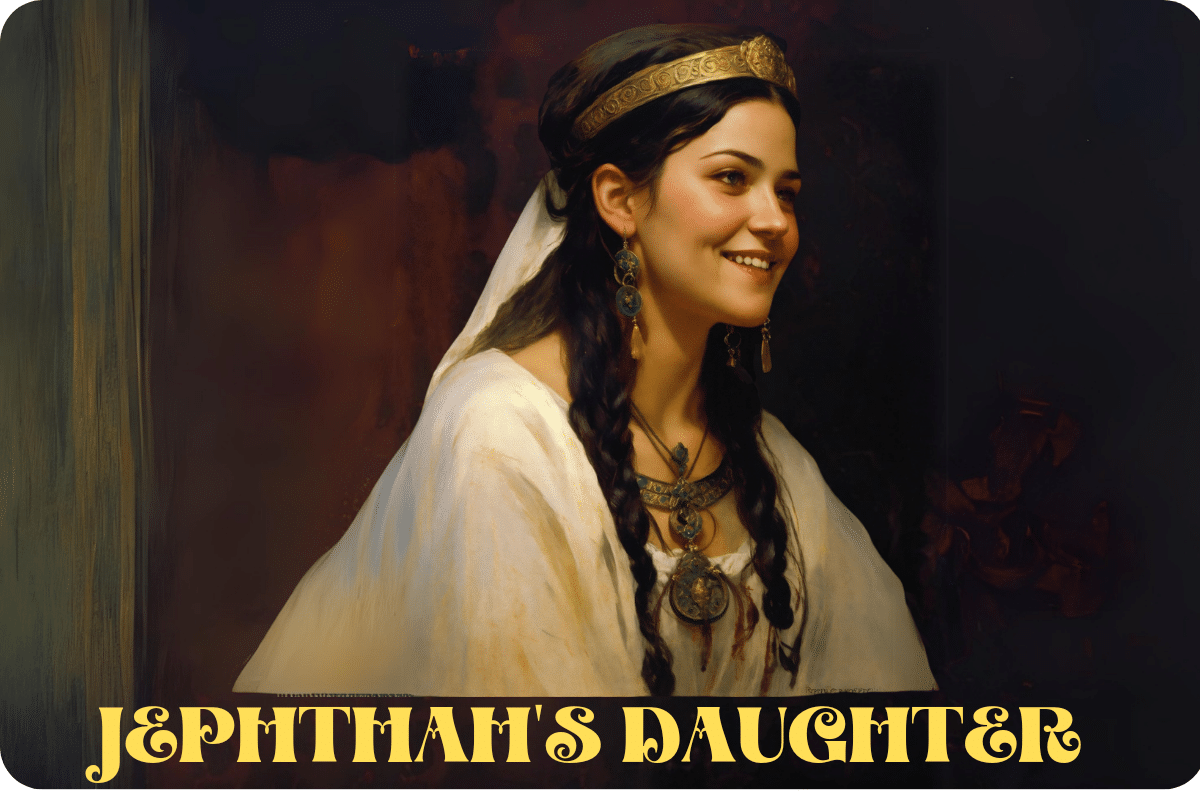JOYFUL JEPHTHAH’S DAUGHTER IN THE BIBLE
The story of Jephthah’s daughter, found in the Book of Judges, is a poignant and thought-provoking tale that explores themes of sacrifice, faith, and human relationships. Jephthah, a judge of Israel, makes a rash vow to God that he will sacrifice the first person to greet him upon his return from battle.

Unfortunately, this person is his only child, a daughter. The narrative raises questions about the consequences of impulsive promises, the cost of leadership, and the human toll of divine bargains. It serves as a somber reminder of the importance of weighing one’s words and actions, especially in moments of great distress or desperation.Judges 11:34-40.
Background of Jephthah
Jephthah, a judge of Israel, rose to prominence despite his humble beginnings as the son of a prostitute. Initially rejected by his brothers, Jephthah’s valor and leadership qualities eventually earned him respect from his peers. His selection by God to lead Israel during a tumultuous period was a testament to his unwavering faith and courage. Jephthah’s story serves as a powerful reminder that God’s choices are not limited by human standards of social status or family background, but rather are guided by His divine plan and the individual’s character.
The Vow
In a moment of desperation before a pivotal battle, Jephthah made a rash vow to God, promising to sacrifice the first thing that came out of his house upon his victorious return. Tragically, the first to greet him was his own beloved daughter, his only child. Jephthah was faced with a heartbreaking dilemma – keep his vow to God or spare his daughter.

Ultimately, he chose to fulfill his pledge, sacrificing his daughter as a burnt offering. This tragic tale highlights the dangers of making hasty vows and the complexities of keeping promises made in the heat of the moment, especially when they come at such a devastating personal cost.
Tragic Outcome
Upon his victorious return from battle against the Ammonites, Jephthah was devastated to find that the first to greet him was his only child, his beloved daughter. Bound by his rash vow to God to sacrifice the first thing that came out of his house, Jephthah felt compelled to follow through, despite his anguish.
The narrative does not explicitly state whether he actually killed her, but it seems Jephthah’s daughter in the Bible accepted her fate with courage, asking only for two months to mourn her virginity before returning to her father. This tragic tale highlights the dangers of making hasty vows and the complexities of keeping promises made in the heat of the moment, especially when they come at such a devastating personal cost.
Interpretations
The story of Jephthah’s daughter in the Bible has been interpreted in different ways by scholars and theologians. Some see it as a cautionary tale about the dangers of making rash vows, highlighting the importance of careful consideration in one’s promises to God.
Others emphasize the themes of obedience and sacrifice, noting Jephthah’s commitment to fulfilling his vow despite its personal cost. This narrative serves as a reminder of the complexities of faith, the pitfalls of impulsive promises, and the personal sacrifices that often accompany leadership and victory.
Implications
The story of Jephthah’s daughter in the Bible delves into the treatment of women in ancient societies, shedding light on the gender dynamics prevalent in religious and cultural practices. It prompts ethical reflections on the morality of Jephthah’s actions and the absence of divine intervention in a situation where a daughter is offered as a sacrifice.
This narrative challenges readers to contemplate the complexities of patriarchal structures, the value placed on women, and the ethical implications of religious vows that involve human sacrifice, sparking discussions on the intersection of faith, gender roles, and moral responsibility.
Comparative Analysis
The story of Jephthah’s daughter, found in the Book of Judges, shares common themes with tales of sacrifice and redemption across various religious traditions. The narrative’s focus on the human cost of divine bargains and the complexities of faith resonates with stories like the binding of Isaac in the Hebrew Bible and the sacrifice of Iphigenia in Greek mythology.
These stories, though distinct, all explore the universal human experiences of sacrifice, obedience, and the search for redemption. This shared thematic landscape underscores the commonalities in human struggles and the enduring power of these stories to evoke emotional responses and inspire reflection on the human condition.
Historical Context
In ancient Israel, the practice of making vows to God was common, reflecting a deep sense of devotion and commitment to divine entities. However, the story of Jephthah’s daughter in the Bible serves as a poignant reminder of the potential dire consequences of such vows, especially when made impulsively or without full consideration of the implications.
Understanding the cultural and historical context of this narrative is crucial to appreciating the complexities of faith, the ethical dilemmas surrounding sacrifice, and the societal norms that shaped the characters’ actions and decisions in a time where religious practices and beliefs held significant influence over personal and communal life.
Impact and Legacy
Over the centuries, the story of Jephthah’s daughter has transcended its biblical origins to leave a lasting impact on literature, art, and popular culture. Its enduring relevance stems from its exploration of timeless themes such as sacrifice, obedience, gender dynamics, and the complexities of faith and morality.
This tragic narrative has inspired diverse interpretations and adaptations, resonating with people of all faiths and backgrounds by delving into profound human experiences and ethical dilemmas. The tale’s ability to provoke reflection and evoke emotional responses underscores its universal appeal and enduring significance in the cultural and artistic landscape.
Modern Interpretations
In modern religious contexts, the story of Jephthah’s daughter continues to spark discussion and debate, particularly through feminist interpretations that illuminate the injustices faced by women in patriarchal societies. These interpretations shed light on the daughter’s plight, emphasizing themes of female resistance, autonomy, and the challenges of navigating oppressive gender norms.
By reexamining this narrative through a feminist lens, contemporary readers engage in critical reflections on power dynamics, gender roles, and the enduring relevance of ancient texts in addressing issues of inequality and injustice within religious and cultural frameworks.
Learn Lessons from Jephthah’s Daughter in the Bible
The story of Jephthah’s daughter offers several valuable lessons that can resonate with readers across different contexts:
- Think Before You Speak or Act: Jephthah’s vow was made impulsively, without considering the potential consequences. This teaches us the importance of thoughtful consideration before making promises or decisions, especially ones with serious ramifications.
- Consider the Impact on Others: Jephthah’s daughter accepted her fate out of loyalty to her father and devotion to God, despite the personal sacrifice it required. This highlights the importance of considering how our actions may affect others, even in difficult circumstances.
- Question Blind Obedience: While obedience to authority figures can be important, blind obedience without critical thinking can lead to harmful outcomes. Jephthah’s daughter’s compliance with her father’s vow raises questions about the balance between obedience and personal agency.
- Value Empathy and Compassion: Despite her own tragic fate, Jephthah’s daughter showed compassion towards her father and sought to ease his distress. This reminds us of the importance of empathy and compassion, even in the face of adversity.
- Reflect on the Consequences of Actions: The story prompts reflection on the far-reaching consequences of our actions, both for ourselves and for others. It encourages us to consider the ethical implications of our decisions and to take responsibility for their outcomes.
- Challenge Injustice and Oppression: Some interpretations of the story highlight the injustices faced by women in patriarchal societies. Jephthah’s daughter’s plight serves as a reminder to challenge oppressive systems and advocate for gender equality and justice.
- Find Strength in Adversity: Despite the tragedy she faced, Jephthah’s daughter displayed resilience and strength in fulfilling her duty. Her story teaches us that even in the most challenging circumstances, there is strength to be found in facing adversity with courage and determination.
By reflecting on these lessons from Jephthah’s daughter’s story, we can gain insights into our own lives and strive to make more thoughtful, compassionate, and ethical choices.
Characteristics of Jephthah’s Daughter in the Bible

Jephthah’s daughter, though not extensively described in the biblical narrative, is characterized by several key attributes:
- Obedient: She demonstrates obedience to her father, as well as acceptance of his vow to God, despite the tragic consequences it entails for her.
- Courageous: Despite her impending fate, she shows courage in facing the situation and asks for a brief period to mourn with her friends before fulfilling her father’s vow.
- Compassionate: Her concern for her father’s well-being is evident in her response to his vow, as she seeks to alleviate his distress by accepting her fate.
- Resilient: Despite the sorrow and hardship she faces, she displays resilience in accepting her fate and fulfilling her duty to her father and to God.
- Symbolic: In some interpretations, she serves as a symbolic figure representing the consequences of rash vows and the sacrificial nature of faith.
- Tragic: Her story is characterized by tragedy, as she becomes the unwitting victim of her father’s impulsive vow and ultimately sacrifices her life as a result.
These characteristics contribute to the complexity and poignancy of her role in the biblical narrative of Jephthah’s daughter.
Reflection
The story of Jephthah’s daughter, like many ancient narratives, continues to resonate across time, offering solace and wisdom to those who engage with its complexities. In a world marked by uncertainty, these timeless tales serve as poignant reminders of the human experience, prompting reflection on themes of sacrifice, faith, and the consequences of impulsive actions.
Through their enduring power to provoke thought and inspire contemplation, these narratives transcend cultural and temporal boundaries, inviting readers to delve into profound ethical dilemmas and moral quandaries that remain relevant and thought-provoking in the present day.
Conclusion
The story of Jephthah’s daughter serves as a poignant reminder of the complexities of human existence and the moral dilemmas we encounter. Through its exploration of sacrifice, faith, and ethical responsibility, this narrative resonates across ages, prompting reflection on the consequences of impulsive actions and the weight of promises made in moments of desperation.
It delves into themes of obedience, autonomy, and the human toll of divine bargains, inviting audiences to contemplate the enduring impact of hasty decisions and the profound ethical questions that arise when personal vows clash with moral principles and societal expectations.
Reference
Unique FAQ’s
- Was Jephthah’s vow justified?
- The morality of Jephthah’s vow is a subject of much debate. While some argue that he was bound by his obligation to God, others question the righteousness of sacrificing his own daughter.
- What lessons can be gleaned from Jephthah’s daughter’s story?
- The story highlights the importance of careful consideration before making vows or promises. It also underscores the need for empathy and compassion in the face of difficult circumstances.
- How do feminist interpretations view Jephthah’s daughter’s fate?
- Feminist perspectives often focus on the plight of Jephthah’s daughter as a victim of patriarchal oppression. They emphasize the need to challenge traditional gender roles and advocate for women’s rights.
- Are there alternative interpretations of Jephthah’s vow?
- Some scholars suggest that Jephthah’s vow could be interpreted metaphorically rather than literally, representing a symbolic commitment to God rather than a literal sacrifice.
- What relevance does the story of Jephthah’s daughter have in modern society?
- The story prompts reflection on issues such as religious extremism, gender equality, and ethical decision-making, making it relevant to contemporary discussions on morality and faith.


1 thought on “28. JOYFUL JEPHTHAH’S DAUGHTER IN THE BIBLE”